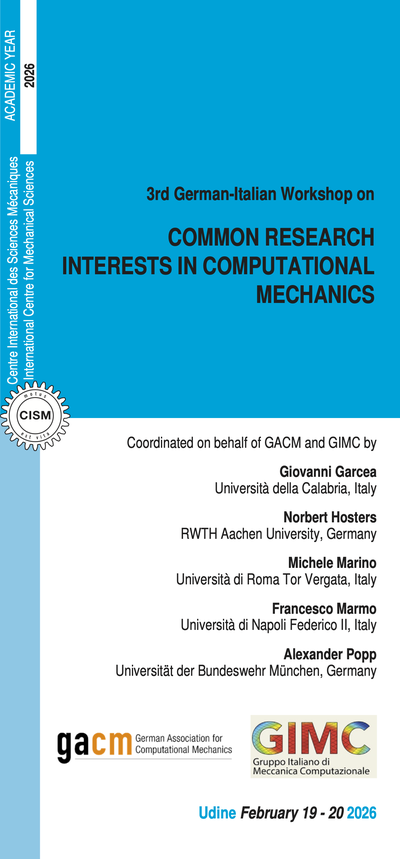W. Hong, X. Zhao, J. Zhou, Z. Suo (2005) “A theory of coupled diffusion and large deformation in polymeric gels” Journal of the Mechanics and Physics of Solids 56 1779-1793.
A. Lucantonio, P. Nardinocchi, L. Teresi (2013) “Transient analysis of swelling-induced large deformations in polymer gels” Journal of the Mechanics and Physics of Solids 61 205-218.
M. Bacca, O.A. Saleh, R.M. McMeeking (2018) “Contraction of polymer gels created by the activity of molecular motors” Soft Matter 15 4467-4475.
V.S. Deshpande, R.M. McMeeking, A.G. Evans (2006) “A bio-chemo-mechanical model for cell contractility” Proceedings of the National Academy of Sciences - USA 103 14015-14020.
G. Noselli, A. Beran, M. Arroyo, A. DeSimone (2019) “Swimming euglena respond to confinement with a behavioural change enabling effective crawling” Nature Physics 179 799-805.
M.W.H. Kirkness, K. Lehmann, N.R. Forde (2019) “Mechanics and Structural Stability of the Collagen Triple Helix” arXiv:1903.07276.
A. Bernheim-Groswasser, N. Gov, S. Safran, N. Tzlil (2018) “Living matter: mesoscopic active materials” Advanced Materials 30 1707028.
4 lectures on: Continuum mechanics and thermodynamics of active soft materials.
1. Non-equilibrium thermodynamics of the continuum; 2. State variables and microstructure evolution of materials; 3. Energy transduction and chemo-mechanics of materials; 4. Contraction of an active gel.
6 lectures on: In-vitro reconstitution of the contractile cytoskeleton.
1. In vitro system as a model for reconstituting cellular processes; 2-3. Actin based motility driven by actin polymerization; 4. Active gels - self-organization and patterning; 5. Actomyosin gels - contractility and poroelasticity; 6. Spontaneous 3D shape transitions of contractile actomyosin gel sheets.
2 lectures on: Systems of motors and bio-filaments and their role in cell motility.
1. Dyneins and microtubules in eukaryotic cilia and flagella; 2. Shape programming in biological and artificial systems.
6 lectures on: Mechanical properties of biological systems at the nano- and micro-scale.
1. (Bio)Polymer mechanics - theory and experiment; 2. Single-molecule mechanics techniques; 3. DNA mechanics; 4. Microrheology - experimental approaches; 5. Collagen mechanics - from molecules to the matrix; 6. Synthetic molecular motors.
4 lectures on: Theoretical and computational modeling of polymer gels.
1. Introduction to polymer physics and review of coupled models for swelling gels; 2. Asymptotic analysis of transient and steady swelling phenomena; 3. Poroelastic fracture in gels; 4. Finite element formulation of the coupled model and applications.
5 lectures on: Cell contractility and adhesion.
1. Acto-myosin stress fibres and cell adhesion; 2. Biochemomechanical mechanisms of contractility; 3. Model of contractility/signaling interactions and in vitro behavior; 4. Interaction of cells with compliant substrates; 5. Modeling in vivo behavior.
6 lectures on: Hydrogels.
1. Hydrogel ionotronics and bioelectronics; 2. Tough hydrogels; 3. Fatigue of hydrogels; 4. Stretchable materials of high toughness and low hysteresis; 5. Hydrogel adhesion; 6. Poroelasticity of hydrogels.
The registration fee is 600.00 Euro + VAT*, where applicable (bank charges are not included). The registration fee includes a complimentary bag, four fixed menu buffet lunches (on Friday upon request), hot beverages, downloadable lecture notes and wi-fi internet access.
Applicants must apply at least one month before the beginning of the course. Application forms should be sent on-line through the following web site: http://www.cism.it. A message of confirmation will be sent to accepted participants. Applicants requiring assistance with the registration should contact the secretariat at the following email address cism@cism.it.
Applicants may cancel their course registration and receive a full refund by notifying CISM Secretariat in writing (by email to cism@cism.it) no later than two weeks prior to the start of the course.
Cancellation requests received during the two weeks prior to the start of the course will be charged a 50.00 Euro handling fee. Incorrect payments are also subject to a 50.00 Euro handling fee.
A limited number of participants from universities and research centres who are not supported by their own institutions can be offered lodging and/or board, if available, in a reasonably priced hotel or student guest house.
Requests should be sent to CISM Secretariat by July 1, 2020 along with the applicant's curriculum and a letter of recommendation by the head of the department or a supervisor confirming that the institute cannot provide funding. Preference will be given to applicants from countries that sponsor CISM.
Information about travel and accommodation is available on the web site www.cism.it, or can be mailed upon request.
* Italian VAT is 22%.





